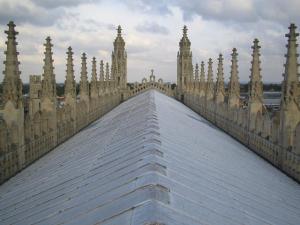A Hog in the Brickwork

Elaborate parapets line both sides of the gable atop King’s College Chapel, Cambridge.
Image: Wikimedia Commons
I remember the day Jimmy Mulligan called me all excited. Jimmy was my foreman when I rehabbed the exterior walls of the West Point Military Academy’s Hotel Thayer.
Even though this call was 50 years ago, I still remember it. Jimmy shouted: “Murray, there’s a hog in the parapet”, and my imagination fed off my ignorance as I tried to picture how an animal like this could be in the parapet.
Now the parapet is the portion of a building’s exterior that extends beyond the roof. Its purpose is to keep people from falling off the roof. Most of the buildings throughout our country have this feature, but few know that the requirement to build parapets originated in the law that God gave Moses.
I had to tell Mulligan that I did not know what he was talking about. I soon learned that a hog in the brickwork meant that the number of courses or vertical layers of brick were different at each corner of the building. Since our work included rebuilding sections of the exterior wall, the job was complicated by the improper work that had been done many years before.
Now I have long forgotten how we solved that problem and its costs, but I remember what I learned that day. Someone had not done his job correctly and we had to bear an additional cost because of that. In short, we had to pay for another’s sin, the sin that caused the flaw in the wall. Sin always has its victims.
There is a difference in the way that God and mankind handle sin. We, mankind, tend to forget our sins and their consequences after enough tomorrows go by. We, at times, sort of resolve not to make the same error again. Our politicians and others say things like: “Mistakes were made and I take full responsibility for them”. However, they almost never say “How much do I owe you for this mistake?” Sin and its consequence somehow just float away to be forgotten in never-never land.
On the other hand, God forgives our sins when we confess them and repent of them. Sometimes he urges us to make restitution for the consequences that followed our failure to live as he posits best. Most times we have to live through those consequences even though we are forgiven, but God never punishes us for our sins when we go to him with a contrite heart. He forgives us and forgets what we have confessed. He, unlike what our neighbors and others often do, enables us to start over with good standing.
Sin is not following God’s ways. It prefers our wants over his. It is ignoring the instructions or manual that came with your new purchase. Sin is caring for ourselves and ignoring our neighbor. Sin is missing the mark; it’s stepping over the line or failing to reach the line. Sin is trashing God’s peace; it’s masquerading, claiming to be something we are not. It’s refusing to listen, to pay attention, to answer the phone. It is assault, saying something untrue, ignoring another, thinking we are better somehow; and it’s flight, disappearing when we are needed, going limp when we should be strong, having excuses, conniving and being manipulative. Sin is perversion, pollution and destruction.
C.S. Lewis once wrote that “all sin is folly ….” And all of us have played the fool. Thank God for the forgiveness he gives to us, because of the high, high price that Jesus paid.
PR
Category: Living the Faith, Spring 2015


